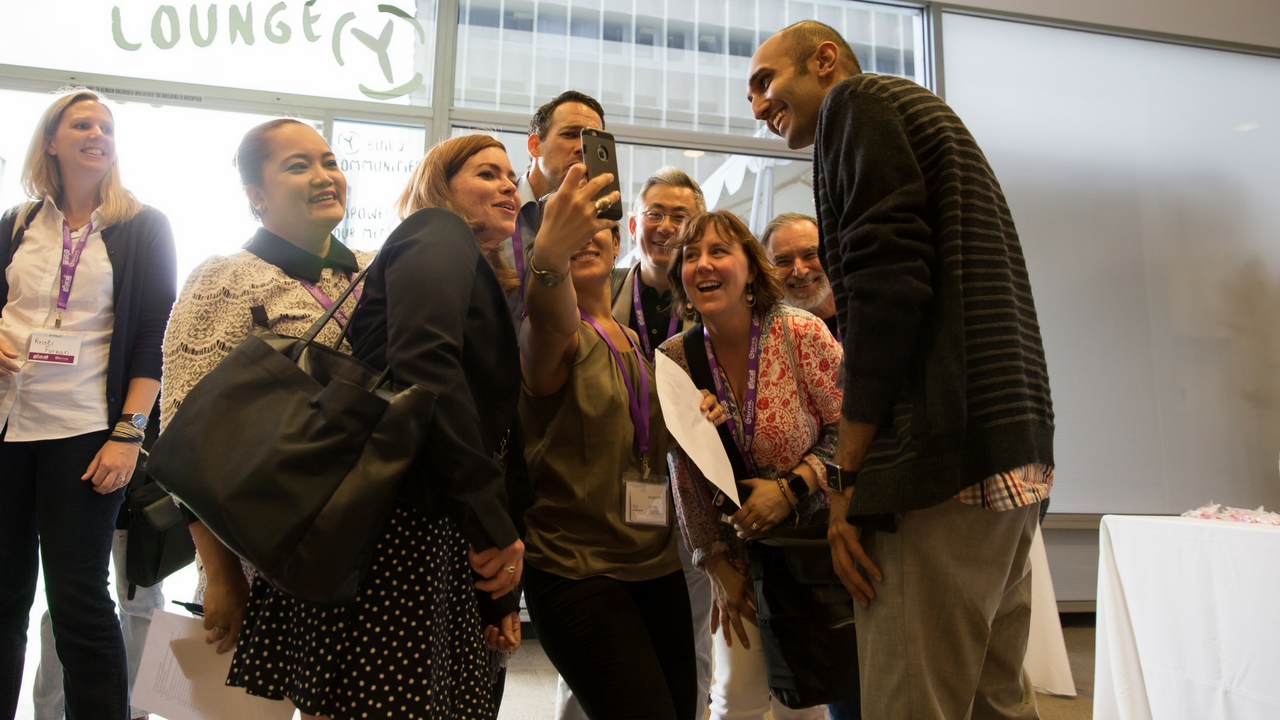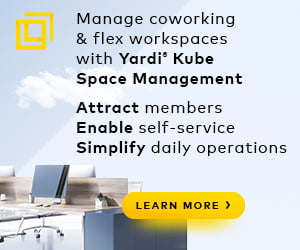- Industry conferences are a great way to get inspired, learn, and meet new people
- There are various flexible workspace events this 2018, from GCUC, Coworking Europe, CU Asia, and the BCA Conference
- Conferences can be daunting, so it’s best to go with a plan in mind on how to approach people, take notes, and get the most out of the experience
It’s February, and the 2018 flexible workspace calendar is already filling up. From GCUC New York to Work 2.0 and Coworking Europe, workspace operators and suppliers have plenty of opportunities to connect, learn and collaborate at industry events around the world.
Conferences offer a wealth of inspiration and networking opportunities, but not everyone has the time or budget to attend multiple events. To help, Allwork.Space gathered insights from flexible workspace professionals who shared their top hacks for a better conference experience, revealing why they attend and how they maximize their time and investment.
What’s In It For Me?
The top reason for attending workspace conferences? Connections.
Based on our research, workspace conferences are the best place to meet new people, make face-to-face connections and lay the foundations for future business prospects. Naturally, it’s also a happy opportunity to catch up with old friends.
Dan Jones, Marketing Manager at ip-Xchange, says: “Primarily, we attend conferences to help generate new business, but they also provide an opportunity to boost your knowledge of the industry.
“For someone like me who was new to the flexible workspace sector (I’m now a 4 year veteran!) they offer the chance to find out what’s new and what’s upcoming.”
For Clare Mackey, Head of Partnerships at Appointedd, it’s an opportunity to find out whether their services are meeting the needs of their target audience.
“Conferences and events enable us to connect with people and learn about new industry trends and innovations, so that we are always providing a product that is relevant and valuable to the market,” she says.
Talking, Sharing Knowledge, and Unconference Learning
Keeping up with emerging trends is an important part of the experience. Yet while speakers and topics are carefully chosen to provide diverse learning and fresh perspectives, attendees often gain just as much information by speaking with other guests.
Networking and coffee breaks aside (more on that later), much of this information can be gleaned during unconference sessions. Unlike the traditional conference model, an unconference lets attendees determine the topics and the direction of the conversation.
As noted by Tony Bacigalupo from New Work Cities, unconference programmes are decided on the day, which means they can incorporate up-to-the-minute industry developments and trends.
“If something happens in the news, or if there’s a major announcement or development within a few weeks of your conference, everyone’s going to want to talk about it,” he said in a recent interview for Allwork.Space with Cat Johnson. “An unconference cultivates a sense of participation and shared investment among the attendees who are now active participants… You’ve now leveled the playing field and allowed for some of those voices to be heard.”
As such, unconference sessions are now becoming a major fixture in the traditional conference format — especially at GCUC (Global Coworking Unconference Conference), which has operated a mixed conference/unconference model since it began in 2011.
As they say, a problem shared is a problem halved, and any collaborative session — particularly unconferences — provide invaluable opportunities to ask questions and learn from others’ experiences (and mistakes). As Tony notes, he often allows time at the end of events “for people to reconvene at end of the day to share what they’ve learned.”
Taking Notes and Memorising Keynotes
The right speaker, or unconference session, can deliver an astonishing array of information in a short amount of time. The question is, how do you keep up with all the facts and figures? And more importantly, how do you retain all that information after the event has finished?
Clare from Appointedd has honed her technique: “I find it helpful to take pictures of key slides in presentations with valuable information that I would like to remember later.”
Better still, she recommends saving copies of the slides — providing they’re made available.
“Many good conferences provide the slides from talks or event video footage online following the event,” she says. “It is good to know in advance if this is the case.”
That said, it turns out that some old habits die hard.
Ilham Halib of 7AY Coworking in Morocco says: “I have a very classical process based on a pen and a notebook. I’m a bit prehistoric and organic, I have never used notepad applications on smartphones and I’ve never recorded on tape. It’s my way to visualize the information: I need to write it down with my own unreadable handwriting.”
Even though Ilham rarely goes back to her notes after the event, it’s the process of putting pen to paper that helps her remember vital pieces of information.
Dan from ip-Xchange agrees: “I’d love to say I have a well organised and meticulous way of making notes. In reality it’s usually me scribbling down a few pointers and key words on whatever I have to hand — usually a notepad, but in the past I’ve tapped it out in a text message and sent it to myself!”
It’s a similar process for Steve Munroe, co-founder of Hubud: “Unlike 95% of my life, I tend to exist on pen and paper during events. I usually don’t take full notes, but I end up with a couple of questions I want to explore more and do so in subsequent sessions or with others that were in the session.”
For content marketer Cat Johnson, conferences are a place to “listen, learn and connect”, and social media provides a great platform on which to continue sharing. In an interview with Bernie Mitchell for his Coworking Conference Survival Guide, she says:
“I tweet like mad when at conferences. Lots of good information and quotes to be found,” adding that “live tweeting from conferences is fun and a great way to share info and ideas.”
Overcoming Networking Nerves
Of course, attending conferences and making connections goes hand in hand with networking. Love it or loathe it, it’s all part of the experience.
7AY’s Ilham solved the awkwardness of networking by sticking to one golden rule: “total serendipity.”
Ilham finds the process of networking “exhausting and counterproductive,” describing it as “a permanent pitch session and an artificial representation” of the people in the room.
“I personally solved my problem with a simple rule,” she explains. “I speak with the person near to me in the line to have a coffee, the nearest person sitting next to me, or the group of people going the same direction as I am. I’m not looking for anybody in particular and I don’t pretend to be someone I’m not.
“Most of the time, it works, because everybody has something interesting to share and I strongly believe that’s the way you find your tribe.”
For those who prefer to tackle networking in the classic style, Hubud’s Steve Munroe has some useful advice.
“Get there a little early. For some people, walking into a packed, noisy room where it seems like everyone (else) knows each other can be overwhelming. Being one of the first gives you an easier ‘in’ to strike up conversation.”
Appointedd’s Clare Mackey adds: “I always like to do a little research to find out who is at the event and what you can learn from them — If you know who you would like to speak to and what you would like to connect with them about, this often makes the idea of entering a room of strangers less daunting.”
And if all else fails? “Simply ask people about themselves and listen,” says Clare. “People love to talk about themselves and you may learn something from it!”
Conference Hacks for Introverts
Sometimes, it’s not just networking that’s daunting. Attending a conference alone can be an intimidating experience.
Janice Chaka is an Introvert Career Coach. She is a regular attendee at conferences and seminars, yet sometimes she still finds the experience overwhelming. The trick is having a fine-tuned strategy.
“Most of the time if I know who is going in advance, I will go just to speak with them,” she says.
“The other thing I might do is volunteer to help out — that way I get to meet everyone without the pressure of having to network.”
If you do feel the pressure, or if the very thought of networking fills you with dread, Janice has some tried-and-tested advice:
“Have a plan. Don’t feel you have to talk to everyone and don’t feel you have to stay for the whole thing — pick events that work for you. If you don’t like huge events, go to smaller ones. I personally love dinners, as then I only have to focus on the few people around me.”
After the Event and Following Up
After a nonstop day soaking up information and trying to remember names and faces, you may find it useful to take time to debrief. Often, it’s worth getting the team together as soon as possible — ideally the very next day — and imparting as much information as possible.
The same goes for following up with people you met at the event.
“It is always best to follow up directly with people as soon as possible following the event whilst the meeting is fresh in your mind,” says Clare. “That way you can remember what you spoke about or what you told them you would follow up with.”
Dan from ip-Xchange has a slightly different approach. “These events are quite full-on and it can be difficult to get a quiet moment to process the information you’ve gained during the day. So, I think it’s best to take a little time after the conference has finished to organise your connections. The most urgent should be contacted within a couple of days and the rest within a week.”
What’s In the 2018 Flexible Workspace Calendar?
Looking ahead, 2018 is full of industry conferences, unconferences, exhibitions and workshops.
7AY’s Ilham says she is most looking forward to GCUC in NYC, the Women Who Cowork retreat in Austin, the next Coworking Europe Conference “and of course, lot of events in Morocco”, while the ip-Xchange team is looking forward to the BCA Conference in London this May.
As for Hubud’s Steve Munroe, he has his sights set on Southeast Asia: “I am biased (as we organize it) but I am most looking forward to CU Asia coming up in Penang, Malaysia, in a few weeks!”
All of the above mentioned events (and more) can be found on the Allwork.Space Events Guide.
Got any conference survival tips to add? Let us know by sharing your pro tips with us on Twitter or Facebook.

 Dr. Gleb Tsipursky – The Office Whisperer
Dr. Gleb Tsipursky – The Office Whisperer Cat Johnson – Coworking Marketing Maven
Cat Johnson – Coworking Marketing Maven Angela Howard – Culture Expert
Angela Howard – Culture Expert Drew Jones – Design & Innovation
Drew Jones – Design & Innovation Andrea Pirrotti-Dranchak – Competitive Advantage
Andrea Pirrotti-Dranchak – Competitive Advantage Jonathan Price – CRE & Flex Expert
Jonathan Price – CRE & Flex Expert Jeremy Fennema – Tech Innovation Alchemist
Jeremy Fennema – Tech Innovation Alchemist










